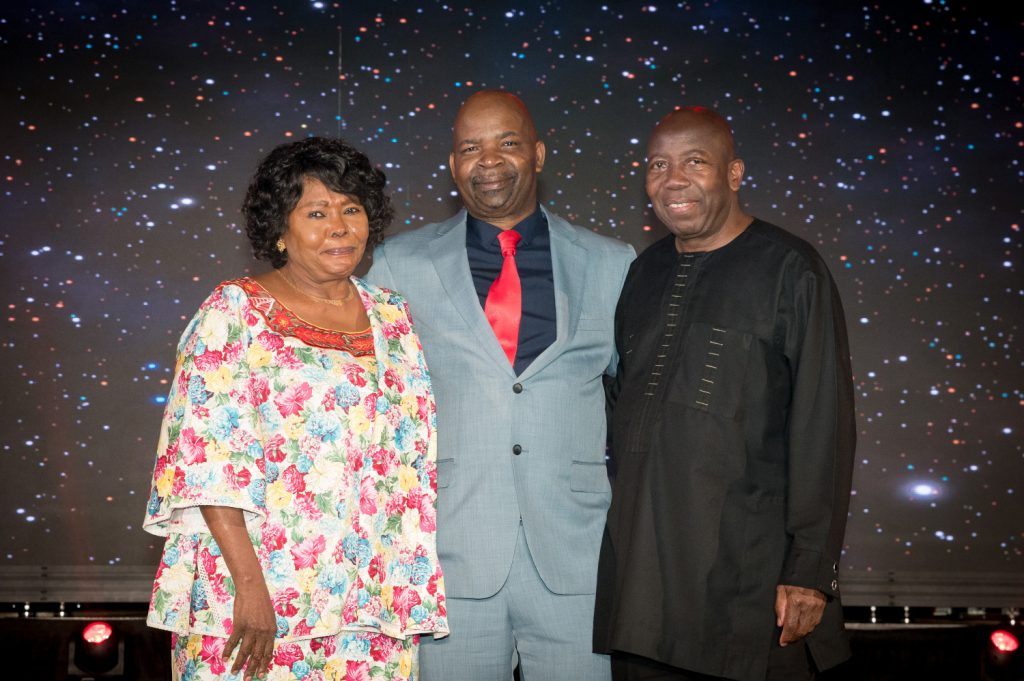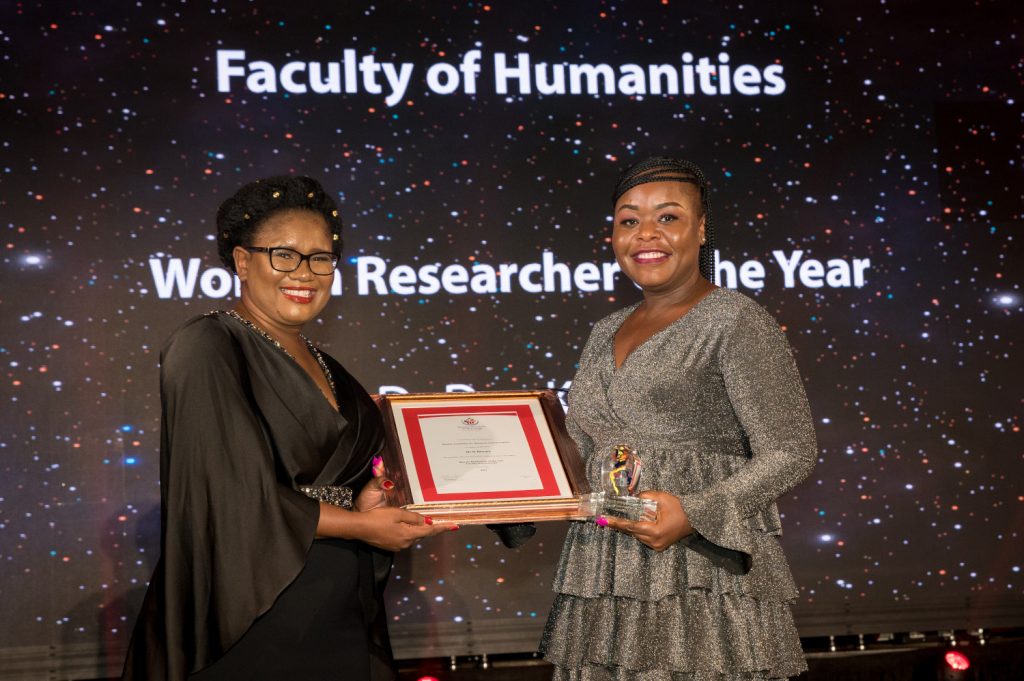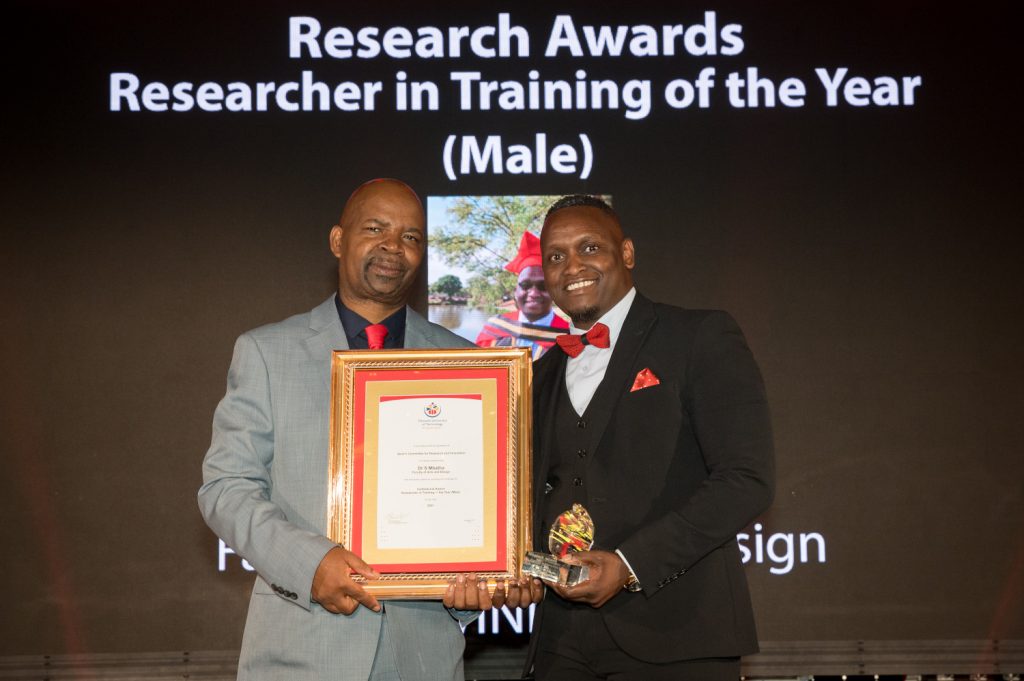TUT academic stars and winners of the excellence awards.
Celebrating academic stars and institutional greatness
There was an undeniable buzz of excitement as lecturers, researchers, innovators and support staff from the Tshwane University of Technology (TUT) took to the blue carpet for a glam-filled Night with the Stars. The gala event, hosted by renowned broadcaster and change-maker Jacqueline Maphala, took place on 29 November at Theunis Bester Hall in Pretoria. Held in partnership with the Mail & Guardian, this was a high-energy, world-class celebration of African academic excellence in action, and of the individuals who embody and channel that excellence to change the world — one student at a time.
Vice-Chancellor and Principal Professor Tinyiko Maluleke said the university was immensely proud of its academic stars, who pushed themselves to challenge their limits and in doing so, elevate the institution’s status as a competitive global hub of knowledge generation and dissemination. “These are the individuals who are not just speakers but doers, and who are moving TUT from good to great.”
 Professor Tinyiko Maluleke, Vice-Chancellor and Principal, flanked by Professor Maggie Momba and Professor Felix Dakora, who were bestowed the VC Chancellor’s Research of the Year Award in the female and male categories.
Professor Tinyiko Maluleke, Vice-Chancellor and Principal, flanked by Professor Maggie Momba and Professor Felix Dakora, who were bestowed the VC Chancellor’s Research of the Year Award in the female and male categories.
He said that the People’s University is a glittering galaxy of ground-breaking excellence, but it is important to acknowledge that the individuals honoured during the awards did not fall into this excellence by accident: “Excellence is never the outcome of luck or even fate; it is always the result of constant and consistent self-application. These colleagues have become the exemplars of TUT’s strategic commitment to future-readiness, impactful research, problem-solving innovation, and [they] keep the People’s University moving from good to great.”
First to assume their position centre stage were the exceptional educators on the receiving end of the Higher Education Development and Support Awards — the Practitioners of the Year, followed by the Lecturer of the Year for each of the university’s seven faculties. The coveted Institutional Lecturer of the Year award went to Sholain Govender-Bateman from the Department of Journalism.
The awards also honoured those who have shown an exceptional commitment to research and innovation, as they not only strive for academic excellence but achieve it. This was despite challenges such as the Covid-19 restrictions, load-shedding, water shortages, social upheaval and limited digital access, in a world where the knowledge landscape is changing at a breakneck pace.
 Dr Vathiswa Papu-Zamxaka, DVC for Research, Innovation and Engagement; and DR Dee Khosa, Emerging Researcher of the Year Award.
Dr Vathiswa Papu-Zamxaka, DVC for Research, Innovation and Engagement; and DR Dee Khosa, Emerging Researcher of the Year Award.
Deputy Vice-Chancellor of Research, Innovation and Engagement Dr Vathiswa Papa-Zamxaka reminded attendees that due to this changing world the race for excellence has no finish line, but that their efforts were changing South Africa for the better: “Your excellence and achievements today respond to the National Development Plan (NDP) 2030, which identifies science, technology and innovation as primary drivers of economic growth, job creation and socioeconomic reform.”
Academic staff who attained new National Research Foundation (NRF) ratings and those who were accepted to science academies also received special mention, as well as the staff who have improved their own academic qualifications in order to set an example for their students.
Professor Maggie Momba and Professor Felix Dapare Dakora, both from the Faculty of Science, were escorted on stage to thunderous applause as they were bestowed the distinguished Vice-Chancellor’s Researcher of the Year Award in the female and male categories respectively. Each was recognised as trailblazers in their field, with unmatched contributions to making knowledge work at the People’s University and beyond.
Deputy Vice-Chancellor of Teaching, Learning and Technology Professor Ben van Wyk said the People’s University also acknowledged that core functions like teaching, learning, research and innovation could not take place without the unwavering support of key partners: “If it takes a village to raise a child; it also takes a village to educate one, and we acknowledge the role of our contributors in security, maintenance, IT and administration.”
 Professor Tinyiko Maluleke and Dr Sipho Mbatha, Institutional Researcher of the Year Award.
Professor Tinyiko Maluleke and Dr Sipho Mbatha, Institutional Researcher of the Year Award.
Under a canopy of fairy lights, attendees were regaled throughout the evening by the talents of opera-singing power couple Bongile Madlala Musa and Lehlohlohonolo Musa, accompanied on the piano by John Manamela. Their powerful performances drew repeated standing ovations. All three performers are alumni of the People’s University and are testimony to the excellence being celebrated — bold, all-encompassing, attention-grabbing excellence that simply refuses to go unnoticed.
The ceremony ended on a high note, with a renewed commitment by the honoured guests that they would keep doing what they do best: shining brightly and lighting the way for others, as they showcase African excellence in teaching, learning, technology, research and innovation. TUT will continue to prepare the students of today with the work-ready skills and the future-focused mindsets required to step into their roles as the academic and industry leaders of tomorrow.
— Jamaine Krige
Fashion for good – and research for real-world impact
Research has the power to shape policy, transform industry and change lives — just ask Senior Lecturer and Head of TUT’s Department of Design Studies, Dr Sipho Mbatha. As one of the first people in South Africa to obtain a PhD in Fashion Design, Mbatha was also the recipient of the institutional Researcher in Training award at the TUT Academic Excellence Awards.
His research areas include national systems of innovation, competitive advantage development and university-industry-government collaborations in the clothing and creative industries, and how these contribute to the achievement of the Sustainable Development Goals and Africa Agenda 2063.
His passion for fashion and the real-world impact of a competitive South African clothing and textiles industry was inspired by and remains deeply grounded in politics, he explained: “My grandfather was a prisoner who spent 20 years on Robben island with people like Nelson Mandela, and I went on to become a student leader, so I know how politics play out and affect people on the ground. Growing up and later finding myself in those environments, I gravitated towards looking at what South Africa needs to do to be competitive. The fact is that the countries that have a competitive advantage are those that are scientifically and technologically sound. Through my work, I’m looking to unlock the potential of South Africa’s design and textile industries.”
The impact of achieving this would stretch far beyond papers and policy and would lead to the significant betterment of the lives of thousands of people operating in this sector. “This is how I know the work I am doing is relevant and necessary,” he said. “We are looking for science and tech solutions for industry that will lead to real-world impact.”
Mbatha said awards such as the one he received earlier this week go a long way to validating his passion and commitment, especially amid the financial challenges that so many researchers face. “Without funding, we will not be able to rise to meet the global players in terms of science, innovation, technology and even knowledge creation. And if we can’t gain ground, then it is not just the institutions that are hindered; it’s the people on the ground that suffer.”
‘Diversity is key to creativity, innovation and knowledge creation’
Excellence is an incremental process that does not come without significant sacrifice. Dr Dee Khosa knows this firsthand. “It took me 15 years to get to where I am today, and the journey was not an easy one,” she said. “But I kept pushing, persevering and enduring, and it paid off.” A lecturer at TUT’s Department of Safety and Security Management in the Faculty of Humanities, Dr Khosa had her efforts rewarded when she was announced as the university’s Emerging Female Researcher of the Year for 2021/2022 at the Academic Excellence Awards.
Khosa said that gender is a fundamental determinant of life, society and the organisations we serve, adding that awards that celebrate women and their contributions to research and innovation are important: “Recognising and taking into account our differences and the varied challenges that we face is paramount in scientific knowledge creation.”
She said that despite strong evidence in literature and statistics that higher education institutions often reproduce social values that lead to gender bias and discrimination, this does not have to be the case. “It is crucial to identify and act upon the mechanisms that need to be changed,” she said.
Showcasing women excelling in fields often dominated by men is also vital for promoting inclusivity and providing other women with role models. In this way, TUT empowers women to excel. And when women have a seat at the table, the world is better for it. “Building gender-diverse teams helps to secure a broader set of viewpoints, contributing to enhanced creativity and innovation.”
Khosa said that every win and each new success inspires and compels her to lift as she rises. “I’m passionate about helping others, and this also means helping them to succeed,” she said, adding that this was a value instilled in her at a young age. “I believe helping people comes from my name, Dorcas, a woman in the Book of Acts who helped people, and when I am doing the same, I know that I am living my purpose.”